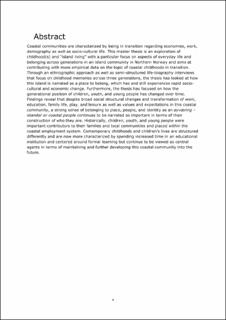| dc.contributor.advisor | Kjørholt, Anne-Trine | |
| dc.contributor.author | Nilsen, Malin Arnesen | |
| dc.date.accessioned | 2022-09-16T17:20:55Z | |
| dc.date.available | 2022-09-16T17:20:55Z | |
| dc.date.issued | 2022 | |
| dc.identifier | no.ntnu:inspera:110182733:5773532 | |
| dc.identifier.uri | https://hdl.handle.net/11250/3018623 | |
| dc.description.abstract | Kystsamfunn er preget av å være i omstilling når det kommer til økonomi, arbeid, demografi i tillegg til sosio-kulturelle aspekter. Denne masteroppgaven utforsker hvordan barndom og «øylivet» har endret seg over tid og har valgt å fokusere på hvordan endringer i hverdagsliv og tilhørighted blir beskrevet på tvers av generasjoner i et øysamfunn i Nord-Norge. Masteroppgaven har som mål å bidra med mer empirisk materiale som omhandler og relaterer til temaet «kystbarndom i endring». Gjennom semi-strukturerte biografiske intervjuer med et fokus på barndomsminner og en etnografisk tilnærming har denne master oppgaven sett på hvordan øya blir beskrevet som et sted å høre til tross for å ha erfart store sosio-kutlurelle og økonomiske endringer over generasjoner og tid, og da potensielt hvordan den generasjonelle posisjonen til barn og ungdommer er i endring. Funnene indikerer at til tross for disse sosiale og strukturelle endringene som har påvirket arbeid, utdanning, familieliv, lek og fritid i tillegg til verdier og forventninger i dette kystsamfunnet, en sterk følelse av tilhørighet til sted, mennesker og en identitet som øyværing eller kystfolk forsetter å bli beskrevet som viktig når det kommer til konstruksjonen av hvem de er. Barn og ungdom har i et historisk perspektiv vært viktige bidragsytere i familier og i lokalsamfunn, og hadde en sentral plass i sysselsettingssystemet på kysten. Dagens barndom er i større grad preget av å være mer struktyrert i form av å tilbringe økt mengde tid i instituasjoner og sentrert rundt forell læring, men blir fortsatt på som viktige aktører i forhold til å opprettholde og utvikle dette kystsamfunnet inn i fremtiden. | |
| dc.description.abstract | Coastal communities are characterized by being in transition regarding economies, work, demography as well as socio-cultural life. This master thesis is an exploration of childhood(s) and “island living” with a particular focus on aspects of everyday life and belonging across generations in an island community in Northern Norway and aims at contributing with more empirical data on the topic of coastal childhoods in transition. Through an ethnographic approach as well as semi-structured life-biography interviews that focus on childhood memories across three generations, the thesis has looked at how this island is narrated as a place to belong, which has and still experiences rapid socio-cultural and economic change. Furthermore, the thesis has focused on how the generational position of children, youth, and young people has changed over time. Findings reveal that despite broad social structural changes and transformation of work, education, family life, play, and leisure as well as values and expectations in this coastal community, a strong sense of belonging to place, people, and identity as an øyværing – islander or coastal people continues to be narrated as important in terms of their construction of who they are. Historically, children, youth, and young people were important contributors to their families and local communities and placed within the coastal employment system. Contemporary childhoods and children’s lives are structured differently and are now more characterized by spending increased time in an educational institution and centered around formal learning but continue to be viewed as central agents in terms of maintaining and further developing this coastal community into the future. | |
| dc.language | eng | |
| dc.publisher | NTNU | |
| dc.title | Childhood and "Island Living". Narratives of Everyday Life and Belonging across Generations in a Small Island. | |
| dc.type | Master thesis | |
